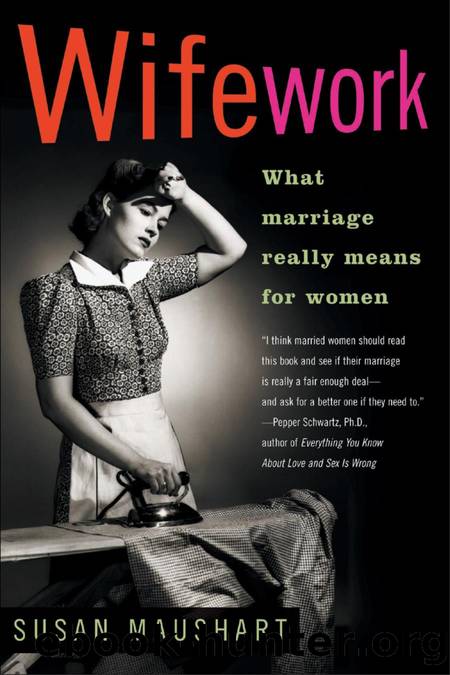Wifework by Susan Maushart

Author:Susan Maushart
Language: eng
Format: epub
ISBN: 9781596919525
Publisher: Bloomsbury Publishing
Published: 2019-11-24T00:00:00+00:00
chapter 11
the wifely art of emotional caregiving
'A young woman becoming a wife should think of her new state not as one that is to make her happy but as one in which she is to make her husband happy. Her own happiness will be a by-product.'
Father D. F. Miller, Catholic Weekly, 1953
In the 1960s, pioneer marital researchers Robert Blood and D. M. Wolfe called it the 'mental hygiene function'. In the 1970s, sociologist Jessie Bernardâwho 'told it like it was' in The Future of Marriageâdubbed it 'the stroking function'. In the 1980s, Arlie Hochschild suggested the term 'emotion work'. Today, call it what we will, the reality of 'doing the intimacy' in marriage remains pretty much what it always has been: wifework. 'In the vast majority of couples today,' writes psychologist Pepper Schwartz, 'the relationship exists on the women's skills. Perhaps the biggest job women carry is to be the expressive member of the couple.'1
The art of emotional caregiving is arguably the most demanding and depleting aspect of wifework a woman will undertake. It is also the most invisible, the least likely to be acknowledged, and the most difficult to outsource. Ironing ladies are a dime a dozen, but intimacy ladiesâat least in this cultureâare not. Nevertheless, the average wife typically directs so much energy towards the care and maintenance of her husband's emotional equilibrium that researchers Jean Duncombe and Dennis Marsden have dubbed it 'The Third Shift'.2
There is no doubt that a lopsided division of emotional labour establishes itself early on in a marriage. One study of newly married couples found that, after only three months, the wives' main complaint was that although they were 'understanding, tender and reassuring to their husbands', their men did not reciprocate. Another study of married women found the greatest source of unhappiness was men's failure to 'do the emotional intimacy'.3 The division of emotional labour within marriage is naturally much harder to quantify than other forms of unpaid labour. But the evidence is clear that the imbalance between husbands and wives is at least as drastic as it is in the more visible areas of housework and parenting.
We are now able to discern that domestic labour and child care are things that women do, rather than expressions of what women are. We remain very far from the same insight about the emotional caregiving wives lavish on their male partners. There is virtually no public debate about this aspect of wifework at all, and only fledgling academic interest. It's no wonder the issue has been described by researchers as 'the last frontier of gender equality'.4 It is treacherous terrain indeed.
The provision of nurturance and care to othersâbut especially to children and menâis widely acknowledged to be a central feature of our social construction of femininity. It is women's work par excellence. To be sure, men also care for and nurture their wives and children. It's simply that, compared to women, the energy and effort they typically expend on emotional caregiving is negligible. This is
Download
This site does not store any files on its server. We only index and link to content provided by other sites. Please contact the content providers to delete copyright contents if any and email us, we'll remove relevant links or contents immediately.
Invisible Women by Caroline Criado Perez;(1642)
Great Goddesses by Nikita Gill(1403)
Bad Feminist by Roxane Gay(1329)
1916 in 1966 by Mary E. Daly(1284)
Hood Feminism by Mikki Kendall(1156)
Antigone Rising: The Subversive Power of the Ancient Myths by Helen Morales(1140)
The Creation of Anne Boleyn by Susan Bordo(1067)
Break the Good Girl Myth by Majo Molfino(1011)
The Beauty Myth: How Images of Beauty Are Used Against Women by Naomi Wolf(902)
How To Be A Woman by Caitlin Moran(884)
Want by Julie Peters(860)
I Am a Feminist by Adams Media(844)
Antigone Rising by Helen Morales(844)
Sway by Pragya Agarwal(787)
The Illustrated Feminist by Aura Lewis(751)
#Girlboss by Sophia Amoruso(740)
Difficult Women by Helen Lewis(705)
Becoming Cliterate by Dr. Laurie Mintz(679)
SCUM Manifesto by Valerie Solanas(678)
